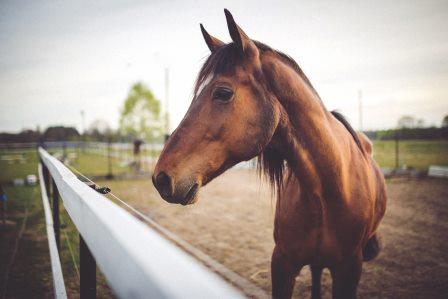Inflammatory Bowel Disease (IBD) of the Horse – Diagnosis and Treatment
A very unpleasant disease in horses is the so-called Inflammatory Bowel Disease of the horse, because it can often only be diagnosed indirectly. The veterinarian uses the so-called oral glucose tolerance test (OGTT) to determine the reduced uptake of food components from the intestine. A reliable diagnosis of the disease can only be achieved by a biopsy covering all layers of the intestine and a subsequent examination of the sample in the laboratory.
Indirect Symptoms of Inflamatory Bowel Disease (IBD)
Chronic diarrhoea is often a leading symptom of IBD in horses. Sometimes a prolonged antibiotic treatment may be the trigger for the symptoms. Many animals show lethargic behaviour and repetitive colic symptoms. In particular, weight loss and changes in the OGTT test indicate the suspicion of IBD. A blood test may often show elevated liver values. Because of the danger of a biopsy of the intestine, many veterinarians will shy away from this procedure and content themselves with a rectal examination of the (swollen) rectum and a determination of the layer thickness using an ultrasound device as a further symptom.

By laboratory tests the multitude of possible pathogens which can cause diarrhoea should be excluded. These pathogens include salmonellosis and clostridia. The question of a chronic worm infestation should also be clarified.In these cases specific treatments should follow.
Immunological Treatment of IBD
There are different treatment approaches for suspected IBD. Initially, the aim is to alleviate the consequences of diarrhoea by infusion treatment. In addition, the aim is to direct intestinal peristaltics into physiological pathways. In addition, chronic inflammation is suppressed by the administration of drugs containing cortisone. But often these horses quickly develop major side effects of this antiinflammatory treatment.
An immunological therapy of Inflammatory Bowel Disease with dendritic cells opens up a more innovative and very easy treatment option. Tolerance modulating dendritic cells have shown in a number of cases convincing results for a rapid recovery of the horse. Our team will be happy to advise you.
Literature: Quelle: Tanquerel L et al. (2020): Clinical and histological features associated with survival in equine inflammatory bowel disease, Poster, ECEIM Congress https://www.eceim.info/system/files/poster-presentations/2020/poster-presentation-574.pdf
Dr. Thomas Grammel ist Tierarzt aus Osterode am Harz. Er führte die Tierklinik Dr. Grammel in zweiter Generation seit 1989. Im Jahre 2019 hat er sie an seine Schwiegertochter Marina Grammel und seinen Sohn Dr. Lukas Grammel übergeben (heute Tiergesundheitszentrum Südharz). Im Schwerpunkt betreut heute Dr. Thomas Grammel deutschlandweit Tiere mit unterschiedlichen Tumorerkrankungen. Dabei behandelt er die Tiere selber vor Ort in Osterode im TGZ Südharz, er berät deutschlandweit aber auch Kolleginnen und Kollegen sowie Patientenbesitzer zur immunologischen Behandlung mit dendritischen Zellen bei erkrankten Tieren. Wichtig ist dabei immer die partnerschaftliche Zusammenarbeit im Sinne der Vierbeiner. Dr. Grammel hat an zahlreichen Kongressen im In- und Ausland teilgenommen und seine Arbeit erfolgreich vorgestellt.

